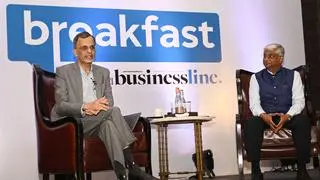World Trade Organisation Director General Roberto Azevedo has asked all members to come back to the negotiating table in September to discuss the way forward as countries failed to strike a deal on trade facilitation on Thursday.
The deadline of July 31 for a trade facilitation pact set in the WTO Ministerial Meet in Bali in December was missed primarily because India refused to support it in the absence of a permanent solution for its concerns on food security.
“The fact we do not have a conclusion means that we are entering a new phase in our work – a phase which strikes me as being full of uncertainties,” Azevedo said expressing grave disappointment over the missed deadline.
Delivering his speech at an informal meeting of the Trade Negotiations Committee late Thursday night, Azevedo said that despite efforts to get a consensus, the remaining gaps (in positions held by key players) were unbridgeable with the time the General Council had.
The DG did not mention a "new" proposal floated by India on Thursday in which it suggested a way out of the stalemate. Commerce Secretary told journalists earlier in the day that India had submitted a new proposal to the WTO, within the contours of the existing proposal made earlier in the month, that could help members to strike a deal.
However, there seemed to be no takers yet for India’s suggestion of a permanent solution that would ensure that its subsidies for food procurement are not actionable at the WTO even if the existing ceiling of 10 per cent of total agriculture production is breached.
India is concerned that once it fully implements its food security programme, its farm subsidies could breach the existing caps. It wants that either the base year for comparing prices to calculate subsidies should be changed from 1986-88 to a more realistic timeframe, or food procurement subsidies should not be subjected to a cap at all.
Without mentioning India, the DG said that the missed deadline could have serious consequences. “My sense, in the light of the things I hear from you, is that this is not just another delay which can simply be ignored or accommodated into a new timetable – this will have consequences. And it seems to me, from what I hear in my conversations with you, that the consequences are likely to be significant,” he said.
This could mean that India may lose the interim protection it got under a peace clause in Bali where members promised not to take action against India for breaching subsidy levels till 2017, by when a permanent solution should be in place.
New Delhi feels that the 'peace clause' does not give it adequate protection as it is attached to numerous conditions and it would also lapse in 2017, which would lead to India losing its bargaining power to get an effective permanent solution.
Azevedo said that during August he would be travelling and talking to members to see how the talks should proceed. “And when everyone is back in Geneva, I will be asking the chairs of the negotiating groups and the regular bodies to consult with Members on what can be done in these changed circumstances,” he said.







Comments
Comments have to be in English, and in full sentences. They cannot be abusive or personal. Please abide by our community guidelines for posting your comments.
We have migrated to a new commenting platform. If you are already a registered user of TheHindu Businessline and logged in, you may continue to engage with our articles. If you do not have an account please register and login to post comments. Users can access their older comments by logging into their accounts on Vuukle.